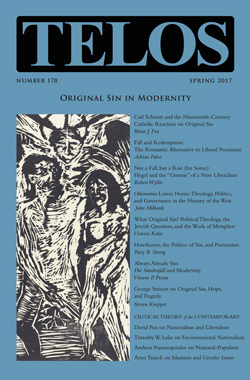Is there any genealogical connection between Christian oikonomia and modern political economy? Originally the turning of polity into household and interpersonal “pastoral” rule was not sinister but an advance. Likewise the Christian doctrines of Trinity and Incarnation resolved rather than sustained aporias of the reserved versus the economizing deity. However, later developments with the Franciscans, Palamites, and Jansenists effectively undid this resolution, producing a new “gnostic” duality. Economic rule was now sundered from ethics in a fallen world seen as utterly depraved. The heterodox discourse and practice of political economy resulted.
|
In response to a speech given by Obama in 2013 on his administration’s counterterrorism policy, popularly referred to as his “drone speech,” General William Nash commented that Obama “has begun the transition from a perpetual war to a more normalized security framework.” I address this normalization of the categorization and control of life within a global threatscape. Much of the debate at policy level, in academia, and on the flickering screens of media outlets surrounding the contemporary fixture of the counterterror arsenal, the drone, focuses upon the legal and ethical implications. Administration officials continually stress the need for “transparency” and the president’s wish that the United States hold itself to “the highest possible standards” in the conduct of a just, humanitarian war—reminding us this is indeed a war, against an organization and its affiliates. Recent initiatives to utilize household and personal mobile technologies to further specific security, surveillance, and counter-terrorism objectives pose significant challenges to civil liberties and personal well-being. The social and political statuses of these technological systems are just emerging: they are rapidly being infused into home settings and mobile devices, apparently under the control of users but under at least the partial monitoring and operation of various governmental and corporate entities. Individuals are being increasingly surveilled by sets of security-related mechanisms in their home automation and mobile communications devices as well as by other manifestations of the “Internet of Things” (IoT). Telos 178 (Spring 2017) is now available for purchase in our store. If the phrase “asymmetrical warfare” is taken to connote scenarios where “one side is possessed of overwhelming power with respect to its adversary,” together with manifold embodiments “of asymmetry in media representations, ideology, religion, sub- and supra-national actors, the environment and even psychology,” then there would appear little doubt that today’s world is pervaded by such conflict. Necessarily, the unique historical conditions of the present, globalizing era—with its fragmenting as well as revanchist states, and its dizzying technological accelerations—are evoked by “new wars” that embroil a proliferation of non-state actors, along with states who believe that they should rightly monopolize (or be immune from, as the case may be) such asymmetrical modalities as nuclear arsenals, mercenary forces, drones, cyberattacks, and propaganda innovations. |
||||
|
Telos Press Publishing · PO Box 811 · Candor, NY 13743 · Phone: 212-228-6479 Privacy Policy · Data Protection Copyright © 2024 Telos Press Publishing · All Rights Reserved |
||||



